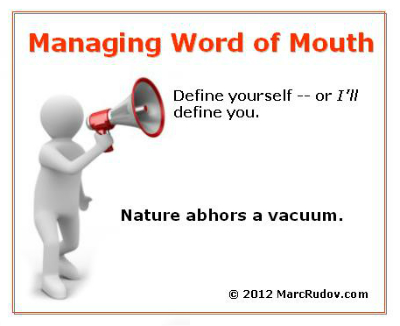Recently, I met a founding partner of an up-and-coming law firm to discuss branding. “Isn’t success really all about word of mouth?” he asked. “Yes, but which word?” I replied.
I continued: “If you don’t supply and manage the word you want your clients to spread, they’ll use the words they choose.” In fact, it was already happening.
Word of mouth, or buzz, is the phenomenon that occurs when people who, after reacting emotionally — positively or negatively — to a product, service, company, experience, article, opinion, person, or performance, broadcast said reactions to their friends and colleagues. The question is, Which words do they broadcast?
A company failing to uniquely, compellingly, succinctly, and memorably articulate its value proposition — in customer language, not industry jargon — creates a branding vacuum and loses buzz control. And, because nature abhors a vacuum, others — customers, investors, channel partners, and journalists — will fill it, for sure. Disaster.

I spoke with an exec at a healthcare startup, pointing out his homepage’s murkiness. He confirmed my critique by admitting that viewers just don’t grasp it. When I pointed out his absent value proposition, he balked and blamed — incorrectly — a weak user interface. Not even close. He’ll let his company remain unfathomable, continuing to allow others to define it (as a confusing mess) with words they choose to spread, if they bother at all. Mistake.
After joining a company as a top marketing exec, I discovered that every country director was branding us differently, according to his perception of our value proposition. Why? No direction from HQ, a branding vacuum. Once I had defined a simple, memorable, repeatable brand for all countries to use, the directors willingly, gratefully, and successfully leveraged it.
Rx from the WhiteNoise Doctor™
Every enterprise needs positive, strong word of mouth — much cheaper than advertising. But, like a budget, the CEO must manage word of mouth — or it will manage him. Nature is always ready, willing, and able to fill a branding vacuum.
Letting others define your company is the antithesis of branding, a blunder the CEO never should tolerate: it needlessly raises the costs of sales, capital, and media.
In the word-vs.-mouth struggle, word must win. Message over megaphone.
In a political campaign, the weak candidate always faces criticism when his opponents and the media define him: classical branding vacuum. In fact, a candidate must define himself.
With the right word — unique, compelling, memorable, repeatable — the mouth spreading it is trivial. Conversely, the wrong word — generic, forgettable jargon — requires reliance on a specific mouth to explain it. Faulty strategy: proxies are unreliable, unpredictable, and rare.
So, to answer the question I posited above, Which word of mouth?: It’s up to you.
POSTSCRIPT #1: Political Perceptions: Micromanaging the Message
© 2012 Marc H. Rudov. All Rights Reserved.
About the Author

Marc Rudov is a branding advisor to CEOs,
producer of MarcRudovTV, and author of four books

